|
|
|
Sort Order |
|
|
|
Items / Page
|
|
|
|
|
|
|
| Srl | Item |
| 1 |
ID:
060682
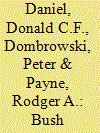

|
|
|
| 2 |
ID:
080188
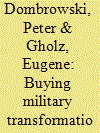

|
|
|
|
|
| Publication |
New York, Columbia University Press, 2006.
|
| Description |
xvi, 189p.
|
| Standard Number |
9780231135702
|
|
|
|
|
|
|
|
|
|
|
|
Copies: C:1/I:0,R:0,Q:0
Circulation
| Accession# | Call# | Current Location | Status | Policy | Location |
| 052993 | 355.62120973/DOM 052993 | Main | On Shelf | General | |
|
|
|
|
| 3 |
ID:
125048
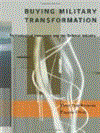

|
|
|
|
|
| Publication |
New York, Columbia University Press, 2006.
|
| Description |
xvi, 189p.Hbk
|
| Standard Number |
9780231135702
|
|
|
|
|
|
|
|
|
|
|
|
Copies: C:1/I:0,R:0,Q:0
Circulation
| Accession# | Call# | Current Location | Status | Policy | Location |
| 057510 | 355.62120973/DOM 057510 | Main | On Shelf | General | |
|
|
|
|
| 4 |
ID:
174635
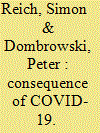

|
|
|
|
|
| Summary/Abstract |
Deliberations over the COVID-19 pandemic's long-term effects on the global balance of power have spurred a large and rancorous debate, including speculation about a shift in the definition of national security and prescriptions about where it should focus. That argument will no doubt continue. But we argue that one consequence is already evident: the United States has spent the last seventy years portraying itself as a security provider in all key domains—for many an intrinsic component of its status as a global leader. One reasonable broad conclusion from the US struggle with COVID-19 is that it has further forfeited its broad leadership position on the basis of its behaviour. Yet that, although possibly true, would only portray one element of the story. The more profound insight exposed by COVID-19 is of a new reality: in a world where both naturogenic and anthropogenic threats pose immense national security challenges, decades of mistaken assumptions and policy choices have created a new environment, one where the United States has been redefined as a security consumer, at least in terms of international public health issues associated with the spread of deadly infectious diseases.
|
|
|
|
|
|
|
|
|
|
|
|
|
|
|
|
| 5 |
ID:
175512


|
|
|
|
|
| Summary/Abstract |
This paper explores the likelihood of maritime crisis stability between China and the United States by building on existing research on the Sino-American naval balance and the concepts of offense–defense theory. Whereas a “denialist” school in security studies argues that counterintervention technology makes defense dominant in the region, the US Navy remains a fleet designed for an offensive approach of power projection and sea control. Although this stubbornness in the face of a sophisticated anti-access capability might be attributable to a strong operational culture and obvious bureaucratic incentives, we posit additional forces suggesting defense dominance will not lead to crisis stability. At sea, offense–defense distinguishability is low and the temptation to strike first is high. Future interaction between current US and Chinese fleet designs risks a crisis or even war that will endanger the US fleet, potentially leading to the loss of the very military advantages underpinning American hegemony that its navy seeks to defend.
|
|
|
|
|
|
|
|
|
|
|
|
|
|
|
|
| 6 |
ID:
133071
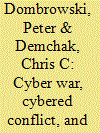

|
|
|
|
|
| Publication |
2014.
|
| Summary/Abstract |
It has been well over a decade since the first “prophets” of information warfare proclaimed a new age of conflict fought not just on air, sea, and land but with electrons in what came to be known as “cyberspace.”1 Since these early predictions, many incidents have confirmed that criminals, random hackers, and government-sanctioned specialists can wreak havoc on governments, military communications systems, and corporations. The Stuxnet worm alone helped delay-by months, perhaps years-the long-standing efforts of Iran to acquire sufficient nuclear material to build nuclear weapons.2 Recent revelations of hacking campaigns against such publications as the Wall Street Journal and New York Times have broadened concerns to include even the integrity of American democratic institutions.3 Meanwhile, the commander of U.S. Cyber Command has characterized cyber attacks designed to gain access to the intellectual property of American corporations as the “greatest transfer of wealth in human history.”
|
|
|
|
|
|
|
|
|
|
|
|
|
|
|
|
| 7 |
ID:
121574


|
|
|
|
|
| Publication |
2013.
|
| Summary/Abstract |
BARACK OBAMA encountered an unprecedented welcome when he visited Israel in March. He was greeted at the airport not just by the usual dignitaries but also by a hot new weapon-Israel's Iron Dome missile-defense system against short-range rockets. A battery was stationed only a few footsteps from Air Force One, so the president could walk over and congratulate his hosts on their successful use of the antimissile weapon during Israel's Operation Pillar of Defense in November 2012.
|
|
|
|
|
|
|
|
|
|
|
|
|
|
|
|
| 8 |
ID:
155474
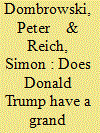

|
|
|
|
|
| Summary/Abstract |
Six months into the Trump presidency, scholars and pundits are already speculating whether the president has developed a ‘doctrine’ or, more expansively, a ‘grand strategy’. No doubt, unfolding events—in Asia, the Middle East and possibly Europe—will sustain this debate about Trump's strategy in the months and, possibly years, to come. It will be prompted by disparate events that stretch from directing vocal threats to the North Koreans regarding their nuclear program to demands that NATO members increase their defence budgets. But, stepping back from Washington's and the media's news cycle, it is worth noting that such deliberation about the Trump presidency is unexceptional. Grand strategy debates are always fashionable. What is overlooked in these raging debates is a prior question: can Donald Trump—or any other American president—implement a grand strategy in the twenty-first century? Our answer is no, they can't. Despite the professed differences among US presidential administrations, each in fact responded to them in markedly similar ways. In fact, we argue, Americans may debate a variety of grand strategies. But a combination of systemic international challenges and bureaucratic tussling between civilian and military leaders ensures that any presidential administration simultaneously implements a variety of calibrated strategies (ranging from liberal institutionalism to restraint and even neo-isolationism), depending on the circumstances.
|
|
|
|
|
|
|
|
|
|
|
|
|
|
|
|
| 9 |
ID:
073057
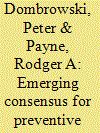

|
|
|
|
|
| Publication |
2006.
|
| Summary/Abstract |
After u September 2001, the George W. Bush administration declared that the United States had adopted a 'pre-emptive' military doctrine to address new threats posed by terrorists and 'rogue states' armed with nuclear, biological or chemical weapons. However, the so-called 'Bush Doctrine' met substantial international opposition when it was proposed - and even more resistance when it was applied to the case of Iraq. Subsequent events in Iraq have not made the idea any more popular. It is somewhat startling, then, that numerous states and international organisations seem now to support the call to revise long-held international understandings about when force might be used. A sizable number agree that the risk of calamitous surprise attacks, especially with nuclear, biological or chemical weapons, might justify preventive strikes or wars against terrorists or their state sponsors. Anew international norm may thus be under construction, though states continue to disagree about the agents of decision and action.
|
|
|
|
|
|
|
|
|
|
|
|
|
|
|
|
| 10 |
ID:
065509
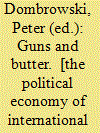

|
|
|
|
|
| Publication |
Boulder, Lynne Rienner Publishers, Inc., 2005.
|
| Description |
viii, 287p.
|
| Series |
The international political economy yearbook, v.14
|
| Standard Number |
158826338X
|
|
|
|
|
|
|
|
|
|
|
|
Copies: C:1/I:0,R:0,Q:0
Circulation
| Accession# | Call# | Current Location | Status | Policy | Location |
| 050118 | 355.033/DOM 050118 | Main | On Shelf | General | |
|
|
|
|
| 11 |
ID:
067289
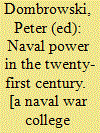

|
|
|
|
|
| Publication |
Newport, Naval war college press, 2005.
|
| Description |
vi, 310p.
|
| Series |
Newport papers; no.24
|
|
|
|
|
|
|
|
|
|
|
|
Copies: C:1/I:0,R:0,Q:0
Circulation
| Accession# | Call# | Current Location | Status | Policy | Location |
| 050506 | 359.6/DOM 050506 | Main | On Shelf | General | |
|
|
|
|
| 12 |
ID:
150278
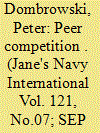

|
|
|
| 13 |
ID:
141121


|
|
|
|
|
| Summary/Abstract |
Critics of US President Barack Obama’s grand strategy have alternatively argued that the president has one and it is wrongheaded, or that he has none and needs one. This latter claim extends beyond the predictable array of Republicans jostling to contest the 2016 presidential election to include varied analysts, academics and even members of the president’s own party, notably Hillary Rodham Clinton.
|
|
|
|
|
|
|
|
|
|
|
|
|
|
|
|
| 14 |
ID:
175509
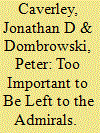

|
|
|
|
|
| Summary/Abstract |
For the first time since World War II the most likely friction points between a rising, potentially revisionist power and a declining, largely status-quo power are located at sea. This special issue accordingly seeks to set an appropriate agenda for security studies research. It presents six interconnected articles exploring different dimensions of maritime competition, largely between China and the United States. Between them, the articles employ three important approaches to security studies: quantitative analysis, pairing classic international relations theory with qualitative evidence, and operational-level research. Together, they consider different geographies—competition and conflict in the Western Pacific versus in the greater Middle East; different issue areas such contending legal claims and control over sea lines of communication; and, finally, different uses of naval power—including blockades, naval diplomacy, fleet engagements, and nuclear escalation. Combined, the issue encourages applying the many classic approaches of security studies to this high-stakes relationship while considering maritime conflict as distinct from other forms, such as land and nuclear, that have traditionally occupied the field.
|
|
|
|
|
|
|
|
|
|
|
|
|
|
|
|
|
|
|
|
|